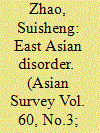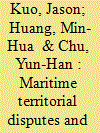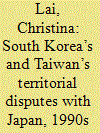| Srl | Item |
| 1 |
ID:
112997


|
|
|
| 2 |
ID:
128020


|
|
|
|
|
| Publication |
2014.
|
| Summary/Abstract |
Northeast Asia's regional cooperation is abysmal. Although China, South Korea, and
Japan have generally compartmentalized bilateral trade relations in order to ensure
continuing prosperity of their respective economies, regionally institutionalized
cooperation remains weak, even in this domain. Trilateral political and security
cooperation among these states is virtually nonexistent. China's disinclination (as
an emerging regional hegemon) toward regional cooperation and Japan's failure
to settle its historical problems are regarded as the key reasons for the lack of
such a development. Yet despite this fraught situation the prospects for regional
cooperation among the three main Northeast Asian powers have seen glimmers of
hope. This paper argues that security is surprisingly one of the areas where scholars
and practitioners envision a foundation for increased opportunities for regional
cooperation. The most noteworthy case is the ongoing coordination among
China, Japan, and South Korea (along with some others) to fight piracy in the
Gulf of Aden area. Beyond the result of reducing piracy on commercial shipping,
the counter-piracy effort has fostered cultural exchange among the region's different
navies and coastguards, offering opportunities for growing the spectrum of maritime
security expertise beyond what each country would be able to do alone. This
paper looks at the implications of this combined effort for other potential areas of
cooperation among the Northeast Asian states
|
|
|
|
|
|
|
|
|
|
|
|
|
|
|
|
| 3 |
ID:
126620


|
|
|
|
|
| Publication |
2013.
|
| Summary/Abstract |
Maritime territorial disputes have become a hot issue in regional security and a pressing issue for Taiwan's national security. While Taiwan is persistently claiming sovereign right over the large part of the South China Sea based on the U-shaped line, its role is however weakened as a result of the cross-strait hostility and its prolonged hands-off policy. Of course, its ambiguous international status, difficult relation with mainland China and domestic political confusion on nation's future have more to do with its inactive role in the South China Sea disputes. This insecurity contributes to its ambivalent policy. This articleintends to address Taiwan's legitimate claim for the part of the South China Sea, which has been unknown and neglected by the international community, and examine the reasons why Taiwan had taken inactive policy toward the South China Sea. Alerted by recent aggressive moves of other claimants, Taiwan is now shifting to a reasonable tougher strategy in the South China Sea. The articlealso projects the course of fresh efforts made by the Taiwan government pressurised by the public with increasing awareness of urgency.
|
|
|
|
|
|
|
|
|
|
|
|
|
|
|
|
| 4 |
ID:
172698


|
|
|
|
|
| Summary/Abstract |
In the South China Sea territorial disputes, China has shifted from a delaying strategy characterized by strategic ambiguity to strategic clarity and an increasingly assertive stance. Yet, this power play, asserting sovereignty over a large portion of the South China Sea, has not prompted a decisive push-back from regional states or major powers, raising the question of what kind of norms China will bring to the regional order and indicating the difficulty of building rules-based order in a region characterized by unbounded power politics in a twenty-first-century Hobbesian struggle.
|
|
|
|
|
|
|
|
|
|
|
|
|
|
|
|
| 5 |
ID:
186134


|
|
|
|
|
| Summary/Abstract |
Territorial disputes over the East and South China Sea have been an issue of growing policy concern in East Asia in recent years. These maritime territorial disputes, as the authors argue in this study, constitute a contextual factor undermining China’s soft power in East Asia. More specifically, this study quantitatively demonstrates that all else equal, citizens are less likely to take a positive view of China’s influence on their respective countries with maritime territorial disputes with China than in countries without such disputes with China. This key result suggests a clear international distributional implication of maritime territorial disputes overlooked in the existing literature on China’s soft power. This study cautions against one-sided views on a China’s soft power whether purely optimistic or skeptical, in contemporary political analyses.
|
|
|
|
|
|
|
|
|
|
|
|
|
|
|
|
| 6 |
ID:
172712


|
|
|
|
|
| Summary/Abstract |
South Korea and Taiwan are former Japanese colonies that have undergone similar processes of state-building since WWII. But they have chosen different rhetorical frameworks in their maritime disputes with Japan. In South Korea, negotiating with Japan can be viewed as threatening the country’s independence and pride, whereas in the Taiwanese government, cooperation with Japan is considered mutually beneficial. Why have these two countries taken such divergent stances toward Japan?
This article examines the territorial disputes between South Korea and Japan over Dokdo, and between Taiwan and Japan over the Senkaku Islands. It sets forth a rhetorical framework of comparison, and it proposes a constructivist perspective in understanding South Korea’s and Taiwan’s legitimation strategies toward Japan from the late 1990s to 2018. This comparative study suggests that the differences between their legitimation strategies can be traced to their different colonial experiences with Japan.
|
|
|
|
|
|
|
|
|
|
|
|
|
|
|
|